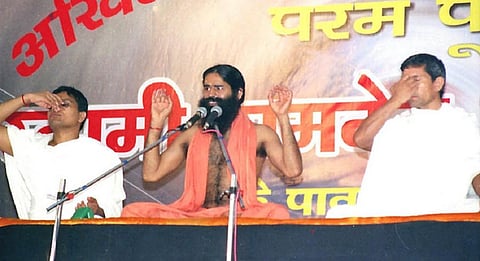

The Supreme Court of India (SC) has slammed Patanjali Ayurved founder Baba Ramdev for his “disparaging” comments on other systems of medicine, particularly allopathy. An apex court bench, headed by Chief Justice of India (CJI) NV Ramana and comprising Justices Hima Kohli and CT Ravikumar, August 23, 2022 noted the yoga guru must exercise restraint in abusing other systems.
“He (Baba Ramdev) can tell greatness about his system. Why should he accuse all the doctors, allopathy, every system of medicine?” the CJI said. “Ultimately, we respect him. He popularised yoga. We all used to go to his programmes and watch yoga. But he should not criticise other systems.”
What is the guarantee that the Ayurveda or whatever system he is following will cure all the diseases, the CJI further asked. “And the type of advertisements, accusing all the doctors as if they are killers…” he added.
The Indian Medical Association (IMA) had filed a plea, following which a notice was issued to Patanjali Ayurved, the central government, Advertising Standards Council of India and the Central Consumer Protection Authority, among others, by the Supreme Court.
The plea sought to restrain companies of alternative forms of medicine such as Ayurveda, yoga and naturopathy, Unani and Siddha (Ayush) from trying to discredit modern medicine. It sought to restrain them from making negative advertisements and statements, particularly in the backdrop of the COVID-19 vaccination drive.
The plea will help ensure legal recourse to baseless statements, argued Dr Abby Philips, senior consultant at The Liver Institute in Kerala. However, he wasn’t entirely satisfied with the SC’s statements.
“The SC noted that systems of medicines should not be criticised and it works both ways. But this is dangerous because scientific temperament requires that pseudoscience be called out,” Philips told Down To Earth. “The apex court also did not question Ramdev about how his products were marketed and the scientific basis of it.”
The SC heard the plea concurrent with several doctors’ associations raising similar issues in the High Court of Delhi. Here, the petitioners argued that Ramdev, via Patanjali, positioned its product ‘Coronil’ as a cure for COVID-19 and claimed vaccines are ineffective.
The yoga guru’s lawyers had earlier agreed to sign a draft statement that noted Coronil does not cure COVID-19, but demanded doctors’ association to be signatories to the same. The talks fell through.
In one of the hearings, the single-judge bench of Justice Anup J Bhambhani noted these claims were giving Ayurveda a bad reputation and requested Ramdev to restrict himself to official statements.
This has been the case for some time for the ancient system of natural medicines that originated in India. A recent paper published on July 2, 2022, in the Indian Journal of Medical Ethics, argued there is a desperate need to update the understanding of ancient textbooks of Ayurveda and put them through scientific scrutiny.
“I consciously select the most rational versions of ancient aphorisms to make them appear relevant,” said Kishor Patwardhan, the author and a professor of Ayurvedic physiology at Banaras Hindu University (BHU).
“Obsolete concepts can be dropped altogether from the curricula of Ayurveda programmes instead of using reinterpretation. There is a need to develop a reliable method to identify such outdated content,” Patwardhan said.
Patwardhan and BHU’s Mrityunjay Dwivedi co-authored a paper published this January in the Annals of Ayurvedic Medicine, a communication platform between practioners and researchers. The two conducted an exploratory analysis of textbooks selected by the Central Council of Indian Medicine for the Bachelor of Ayurvedic Medicine and Surgery programmes.
The two critique the quality of the curriculum with no textbook meeting the expected standards in the paper’s conclusion.
Ayurveda is historically and culturally important for us, Dr Philips said in the same vein. “Students are also taught modern medicine, but they practice pseudoscience. This is where the dissonance and baseless confidence arises from.”
The doctor drew parallels between ancient Chinese medicine and Ayurveda and said that Chinese knowledge was translated into drug discovery to treat malaria. “We must use Ayurveda as a translational tool — apply basic concepts to a clinical scenario. It shouldn’t be applied as a healthcare modality,” he said.
Textbook development committees must be set up and peer-reviewed as a way forward to better Ayurveda education, Patwardhan’s January paper suggested. “Multi-authored textbooks should be framed in a planned way to ensure uniformity and quality with the help of experts from various fields, such as education, biomedicine, Ayurveda and others,” it said.